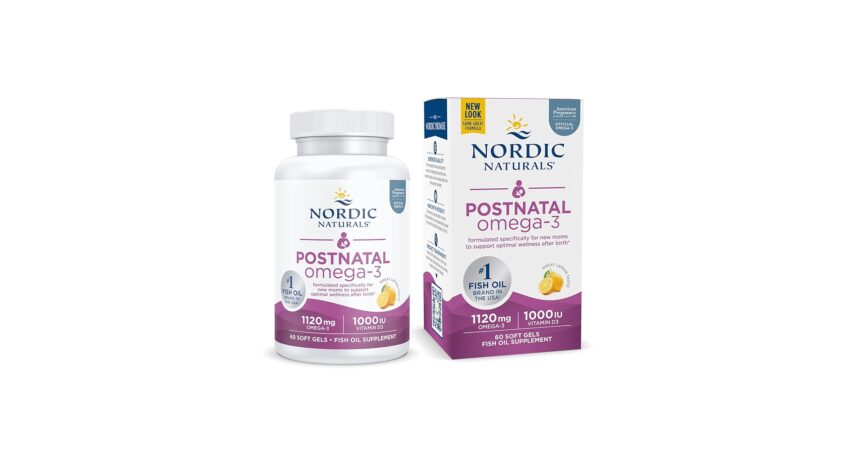The postpartum period marks one of the most transformative phases in a woman’s life. After childbirth, the body begins a complex recovery process that involves healing, hormonal balance, lactation, and rebuilding nutrient stores. During pregnancy, essential vitamins and minerals are heavily drawn upon to support fetal growth. Once the baby arrives, the mother’s body must restore these reserves to maintain energy, immunity, and emotional well-being. Among the most important nutrients for recovery are vitamin D3, iron, and omega-3 fatty acids. Each plays a unique and vital role in physical and mental restoration after childbirth.
Understanding Postpartum Nutrient Depletion
During pregnancy and delivery, the female body experiences significant nutrient shifts. Blood loss at childbirth reduces iron levels, while calcium and vitamin D3 stores are tapped to support bone development in the baby. Lactation further increases nutritional demands—breast milk production draws from the mother’s energy and nutrient reserves. If not replenished adequately, deficiencies can result in fatigue, mood instability, weakened immunity, and slower recovery.
A balanced postpartum diet rich in micronutrients is key, but many women still fall short of optimal levels through food alone. That’s where high-quality nutritional support—such as a scientifically formulated multivitamin—can help bridge the gap. ACTIVIT, for example, offers a comprehensive multivitamin and multimineral supplement containing vitamin D3 and iron among other essential nutrients in their most bioavailable forms & optimal dosages.
The Role of Vitamin D3 in Postpartum Recovery
Why Vitamin D3 Is Essential After Childbirth
Vitamin D3 (cholecalciferol) is often called the “sunshine vitamin,” but its role extends far beyond bone health. After childbirth, women are at a higher risk of vitamin D deficiency due to limited sunlight exposure, time spent indoors caring for the newborn, and increased calcium demands for bone remodeling and breastfeeding. Adequate vitamin D3 supports calcium absorption, immune defense, muscle strength, and mood balance.
Research has shown that postpartum women with low vitamin D levels are more prone to fatigue, joint pain, and depressive symptoms. Since the nutrient also influences serotonin production and immune modulation, restoring vitamin D3 levels can help support both physical energy and emotional well-being.
Sources and Supplementation Tips
Natural sunlight is the most efficient way to produce vitamin D3, but lifestyle factors and geography often make it insufficient. Dietary sources include fatty fish, fortified dairy, and egg yolks, yet these may not provide enough for recovery. For this reason, many health professionals recommend postpartum supplementation.
When choosing a vitamin D3 supplement, look for cholecalciferol—the most bioavailable form. Taking it with a meal containing healthy fats enhances absorption, as vitamin D is fat-soluble. Regular blood testing can help monitor levels and ensure dosage adequacy during the months following childbirth.
Iron: The Foundation of Postpartum Strength
Why Iron Matters After Delivery
Iron deficiency is among the most common postpartum concerns. Blood loss during delivery and increased iron requirements during pregnancy can leave mothers anemic. Iron is central to hemoglobin production, the protein that carries oxygen throughout the body. When iron levels drop, fatigue, dizziness, and low concentration often follow.
Anemia in the postpartum phase can affect not only the mother’s recovery but also her ability to maintain energy levels for breastfeeding and newborn care. Insufficient iron may also reduce milk supply or contribute to mood instability due to decreased oxygen delivery to brain tissue.
Signs of Postpartum Iron Deficiency
Typical signs include persistent tiredness, paleness, shortness of breath, headaches, and brittle nails. Women who experienced significant blood loss during birth, had multiple pregnancies, or follow vegetarian diets are at higher risk.
How to Rebuild Iron Stores
Dietary sources like red meat, lentils, spinach, and fortified cereals can help, but restoring iron stores often requires supplementation. Iron in the ferrous bisglycinate form—found in premium multivitamins like ACTIVIT—is gentle on the stomach and less likely to cause constipation compared to traditional forms. Pairing iron with vitamin C (from citrus fruits or supplements) enhances absorption, while avoiding tea, coffee, or calcium-rich foods at the same time prevents interference with uptake.
A healthcare provider may recommend checking hemoglobin or ferritin levels before adjusting iron intake. Gradual restoration helps sustain energy, oxygen transport, and overall vitality during the months following childbirth.
Omega-3 Fatty Acids: Nourishing the Mind and Body
The Importance of Omega-3s in the Postpartum Period
While vitamin D3 and iron restore physical strength and immune balance, omega-3 fatty acids—particularly DHA (docosahexaenoic acid) and EPA (eicosapentaenoic acid)—play an equally crucial role in brain and emotional health. These essential fats support cognitive function, mood stability, and cardiovascular wellness. For breastfeeding mothers, omega-3s directly influence the DHA content of breast milk, which is vital for the infant’s brain and eye development.
Several studies suggest that low omega-3 levels are associated with an increased risk of postpartum depression and anxiety. Omega-3s also help reduce inflammation, support hormone regulation, and promote healthy skin and hair recovery after childbirth.
Where to Find Omega-3s
Fatty fish such as salmon, sardines, and mackerel are the best dietary sources. For vegetarians or those who avoid fish, flaxseeds, chia seeds, and walnuts offer plant-based omega-3s, though these primarily provide ALA (alpha-linolenic acid), which converts inefficiently to DHA and EPA. In such cases, an algae-based omega-3 supplement is a suitable alternative.
It’s worth noting that some multivitamins—like ACTIVIT—focus primarily on vitamins and minerals and do not include omega-3 fatty acids. Therefore, postpartum women may consider adding a separate omega-3 source to their routine for a more complete recovery plan.
Integrating Nutrient Repletion into Daily Life
1. Prioritize a Balanced Diet
Supplements work best alongside nutrient-dense foods. A postpartum diet should emphasize lean proteins, leafy greens, whole grains, fruits, and healthy fats. Including iron-rich foods with vitamin C sources, such as spinach with citrus, helps improve nutrient absorption. For vitamin D3, fortified dairy or oily fish can add support, while omega-3-rich meals enhance both maternal and infant health.
2. Maintain Consistent Supplementation
Consistency is crucial for restoring nutrient levels. Taking a high-quality multivitamin daily ensures ongoing support for micronutrient balance. As indicated on the ACTIVIT product page, the supplement is taken with meals to enhance absorption. Regular intake, combined with a nutritious diet, supports sustained energy, bone strength, and immune defense during recovery.
3. Prioritize Rest and Hydration
Physical recovery requires more than nutrition alone. Adequate rest, hydration, and gradual physical activity contribute significantly to postpartum healing. Drinking enough water aids in milk production and nutrient transport, while gentle exercises like walking or stretching support circulation and mood stabilization.
4. Monitor Health Markers
Postpartum check-ups provide an opportunity to assess iron, vitamin D, and general metabolic health. Women experiencing persistent fatigue, mood swings, or low energy should discuss possible nutrient deficiencies with their healthcare provider. Blood tests for hemoglobin, ferritin, and vitamin D status can help guide tailored supplementation.
Choosing a Reliable Nutritional Support
Postpartum nutrition requires trusted, evidence-based supplementation. With so many options available, product quality and transparency are key. ACTIVIT stands out for offering a balanced combination of essential vitamins and minerals in bioavailable forms. Its formulation includes vitamin D3, iron (as ferrous bisglycinate), and 22 other key nutrients. The supplement is certified by NSF, GMP, USP, and JECFA, meeting strict safety and efficacy standards. Available in easy-to-digest tablet form, it supports daily nutrient maintenance without unnecessary fillers or artificial additives.
While this product does not include omega-3s, it pairs effectively with dietary sources or dedicated omega-3 supplements to form a complete postpartum recovery strategy. Its clean composition and certifications make it a dependable choice for women seeking comprehensive micronutrient support after childbirth.
Holistic Recovery Beyond Supplementation
Restoring nutrients is only one aspect of postpartum healing. Emotional well-being, physical rehabilitation, and self-care practices are equally essential. Adequate sleep—though often fragmented with a newborn—helps regulate hormones and mood. Light exposure during the day supports natural vitamin D synthesis and circadian rhythm alignment. Social support and open communication with healthcare providers also enhance recovery outcomes.
Stress management through gentle yoga, meditation, or deep-breathing exercises can complement nutrient repletion by lowering cortisol and promoting better nutrient utilization. Staying consistent with follow-up medical visits ensures that any lingering deficiencies are identified and corrected promptly.
The Long-Term Benefits of Postpartum Nutrient Balance
Replenishing vitamin D3, iron, and omega-3 fatty acids not only accelerates recovery but also lays the foundation for long-term health. Adequate vitamin D strengthens bones, muscles, and immunity. Optimal iron levels restore stamina, prevent anemia, and improve cognitive focus. Omega-3s enhance mood, cardiovascular function, and neurological well-being. Together, these nutrients support a smoother transition into motherhood, helping women regain vitality and emotional balance.
Consistent nutrient care also benefits the infant indirectly—breast milk quality improves when the mother’s micronutrient stores are sufficient, promoting healthy development in early life.
Conclusion
The postpartum period demands mindful attention to nutrition and recovery. Vitamin D3, iron, and omega-3 fatty acids are three pillars of maternal well-being, each addressing distinct yet interconnected aspects of physical and emotional health. Rebuilding these nutrients helps prevent fatigue, mood disturbances, and long-term deficiencies.
A balanced diet remains the cornerstone of recovery, but nutritional supplementation offers valuable support. Certified multivitamins such as ACTIVIT, which provide bioavailable forms of D3 and iron, can effectively fill key gaps while maintaining quality and safety. Combining such supplementation with omega-3-rich foods, regular check-ups, and self-care practices ensures that new mothers regain strength, resilience, and vitality for both themselves and their growing families.


